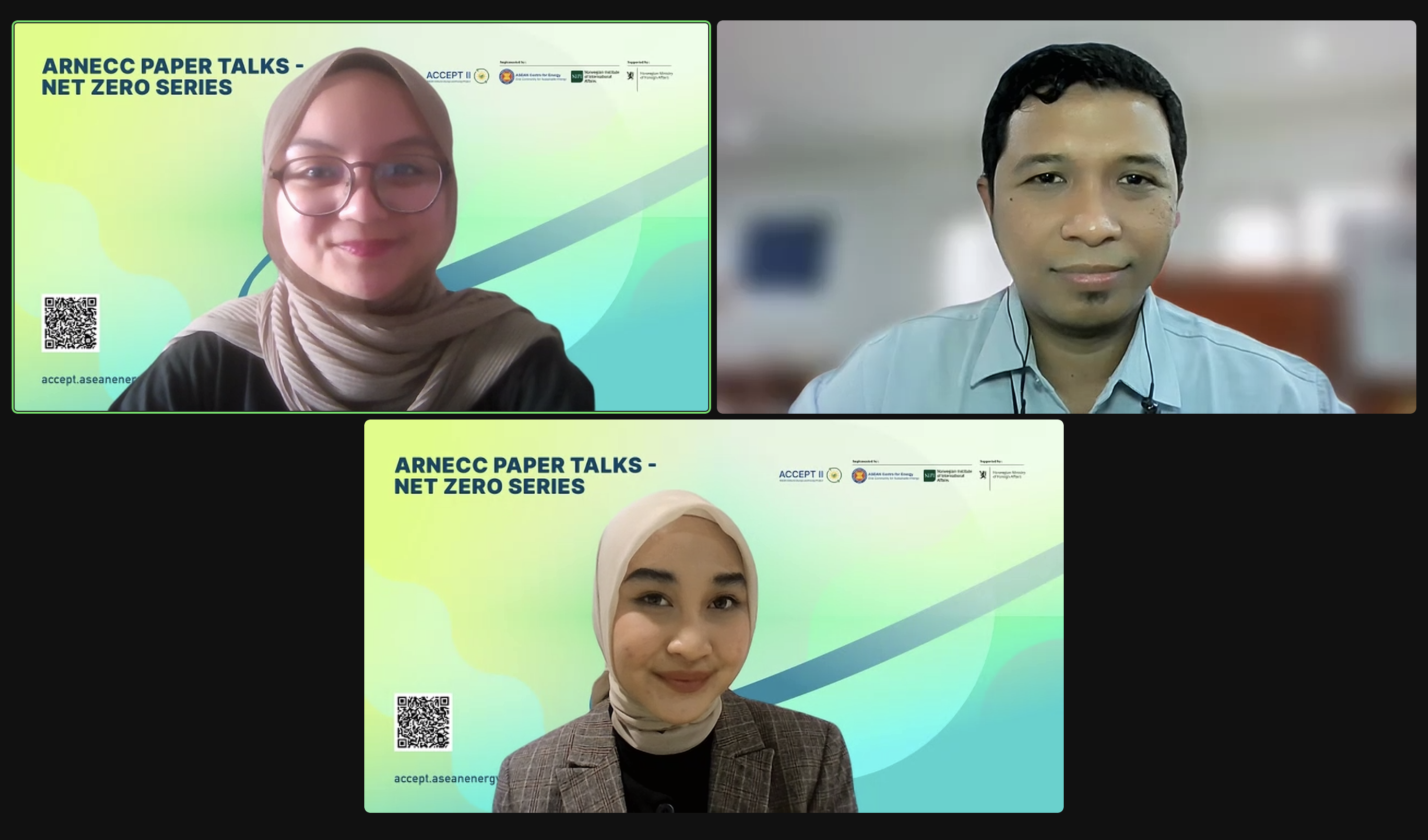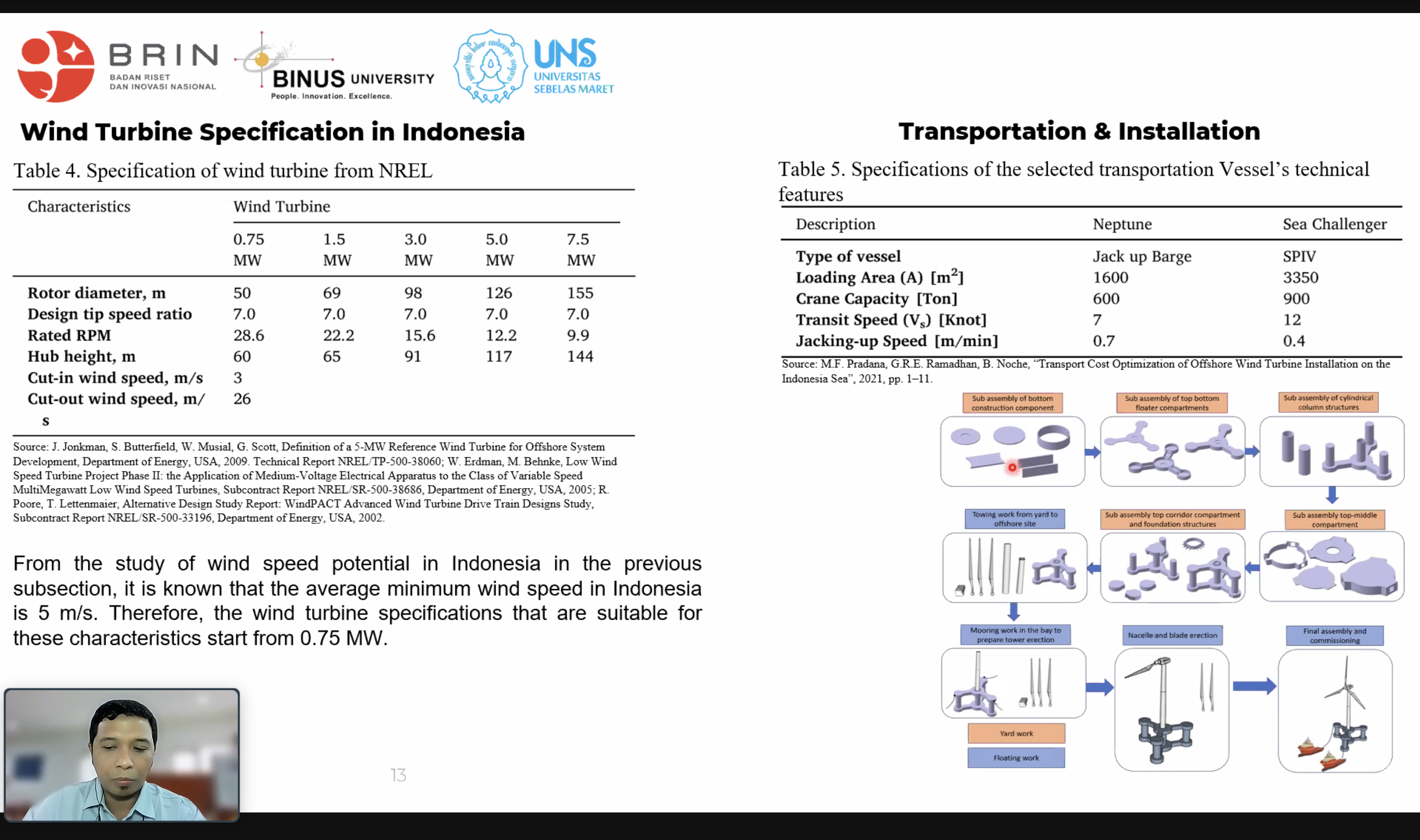i
i
Online, 24 July 2024
The ‘ARNECC Paper Talks 2.0’ is celebrating nine episodes this month. The ASEAN Climate Change and Energy Project (ACCEPT) is hosting a virtual discussion series, as part of the flagship activity of the ASEAN Researchers Network on Energy and Climate Change (ARNECC). The initiative aims to provide a knowledge-sharing platform focusing on energy-climate and decarbonisation for members of academia. This month, ACCEPT welcomes Mr. Yudiawan Fajar Kusuma from National Research and Innovation Agency (BRIN) to present his findings from recent academic paper titled “Navigating challenges on the path to net zero emissions: A comprehensive review of wind turbine technology for implementation in Indonesia” which assess the ideal design of Floating Offshore Wind Turbines (FOWTs) besides determining the geographical locations to deploy FOWTs. The study provides holistic approach on how adoption of FOWTs are aligned with Indonesia’s aspiration to achieve net zero by 2060. The session is moderated by Zahrah Zafira from ASEAN Centre for Energy (ACE) while the master of ceremony is Shahnaz Namira Fairuza, ACCEPT II Research Assistant.

Figure 1. Mr Yudiawan Fajar Kusuma, National Research and Innovation Agency (BRIN) as the speaker (top right), Shahnaz Namira Fairuza from ACCEPT II as Master of Ceremony (top left), and Zahrah Zafira from the ASEAN Centre for Energy as the moderator (bottom).
The paper unveils the research gap between various technologies of Floating Offshore Wind Turbines (FOWTs) available worldwide and identifying the suitable technologies to be implemented in Indonesia. Renewable energy (RE) has been acknowledged as a catalyst to boost energy transition in Southeast Asia. The Indonesian government has set a vivid target to achieve 23% of RE consumption for energy supply. The ambitious target has driven the Indonesian government to leverage on the nation’s resources, primarily on the wide and long coastlines and abundance of wind presence. Several types of FOWTs design are outlined in the study, mainly submerge. Based on the floating optimisation framework, several considerations are outlined, including time, frequency and design. Besides, the constraints related to technical aspects, such as buoyancy, geometry, pitch angle and height shall be addressed in selecting the ideal type of FOWTs adoption.
On top of that, the logistic and deployment of offshore wind turbines, especially the manufacturing facilities, wind farm and port locations play a crucial role in determining the design of FOWTs. Mr. Yudiawan proposed in the studies for the height of floating offshore wind turbine between 50 and 80m, whereby three types of floating mechanism can be adopted; spar, semisubmersible and TLP. Through this workflow, he conveyed two options either neptune or sea challengers to transport and assemble the FOWTs.

Figure 2. Outline the specifications of wind turbines and logistic options that are feasible to implement in Indonesia.
During the Q&A session, Mr. Yudiawan proposed to deploy wind turbines with a capacity of 1kW and open several wind farms to minimise the cost. He conferred the second question as Indonesia’s government is focusing more on deploying solar and tidal as the technologies is easy to be installed and relatively cheaper compared to FOWTs. Nevertheless, there are a few wind turbines installed in South Sulawesi. In relation to funding mechanism to pursue FOWTs, there is limited funding to mobilise the installation of FOWTs. To date, Mr Yudiawan mentioned there are no standards in transporting and the selection of vessels. In addition, a few challenges highlighted by Mr Yudiawan are limited fundings, the gap between regulations and industry and accessibility in mobilising the wind turbines components. Thus, addressing these challenges will contribute to Indonesia’s net zero targets through the increase in installed renewable energy shares.
On a final note, Mr. Yudiawan expressed his hope that the development of wind turbines will progress in Indonesia, although the funding may not come from the government. His vision is for the floating offshore wind turbine to be more than just a pilot project.
(IB)
Join our ASEAN Researchers Network on Climate Change (ARNECC) by registering yourself here. Become a part of our collaborative efforts to address pressing climate challenges and shape a sustainable future.
Detailed information on ACCEPT II can be found at https://accept.aseanenergy.org/
We welcome any future collaboration, please feel free to contact us at [email protected]